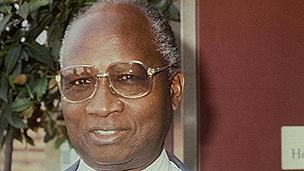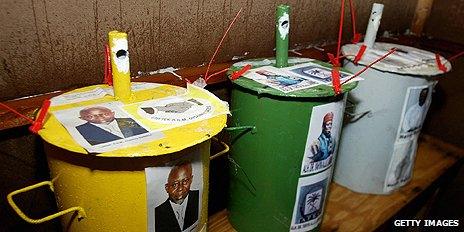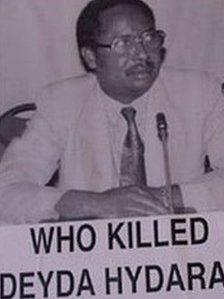The Gambia profile - Timeline
- Published
A chronology of key events:
1455 - Portuguese establish trading stations along Gambia river.

Dawda Jawara was prime minister at independence and was ousted in 1994
1889 - Present boundaries of The Gambia set by agreement between Britain and France.
1894 - The Gambia becomes a British protectorate.
1965 - The Gambia becomes independent with Dawda Jawara as prime minister.
1970 - The Gambia becomes a republic following a referendum; Mr Jawara elected president.
1981 - Five hundred people are killed as Senegalese troops help suppress a coup.
1982 - The Gambia and Senegal form a loose confederation called Senegambia, which collapses in 1989.
Coup
1994 - President Jawara ousted in coup led by Lieutenant Yahya Jammeh.

Gambia has an unusual voting system in which voters deposit marbles into a steel drum marked with the candidate of their choice
1996 - New multiparty constitution promulgated, but three major political parties still banned from taking part in elections; Jammeh elected president.
2001 23 July - President Jammeh lifts the ban on the political parties he overthrew in his military coup of 1994.
Second term for Jammeh
2001 October - President Jammeh wins a second term. Foreign observers give the poll a clean bill of health in spite of rising tension ahead of the vote.
2002 May - Opposition MPs and journalists condemn a new media law, passed by parliament, as draconian and intended to muzzle the independent press.
2004 February - President Jammeh announces the discovery of large reserves of oil.
2004 December - New press law provides for the jailing of journalists found guilty of libel, sedition. Days later a critic of the law, prominent editor Deyda Hydara, is shot dead.
2006 August - Thousands flee into Gambia from Senegal's southern Casamance region to escape fighting between Senegalese troops and separatists.
Third Jammeh term
2006 September - President Jammeh wins a third term.

Deyda Hydara, a critic of strict media laws, was murdered in 2004. Others journalists have gone missing or have been jailed
2007 February - UN development envoy Fadzai Gwaradzimba is expelled for criticizing the president's assertion that he can cure AIDS.
2008 May - President Yahya Jammeh tells a rally that he would "cut off the head" of any homosexual found in The Gambia, prompting an outcry from international gay rights campaigners.
2009 March - Amnesty International says hundreds have been kidnapped during a government campaign against "witchcraft".
2009 September - President Jammeh threatens to kill human rights workers as saboteurs.
2010 October - Death penalty introduced for possession of cocaine or heroin in a bid to discourage international drug trafficking.
Fourth Jammeh Term
2011 November - President Jammeh wins another term in widely criticised elections.
2012 June - Ex-justice minister Fatou Bensouda is sworn in as the International Criminal Court's new chief prosecutor in The Hague.
2013 October - President Jammeh announces Gambia's withdrawal from the Commonwealth, describing it as a "neo-colonial institution".
2015 January - Dozens of soldiers and civilians are arrested following December foiled coup bid.
2016 Summer - Government carries out crackdown on political opponents ahead of December elections. Opposition party member Ebrima Solo Kurumah dies in custody in August.
End of Jammeh's rule
2017 January - President Jammeh goes into exile after losing December election to opposition candidate Adama Barrow, but only after neighbouring countries threaten military intervention.
2017 April - Parliamentary elections give an absolute majority to the United Democratic Party. It trounced the APRC - the dominant party under Yahya Jammeh's rule.